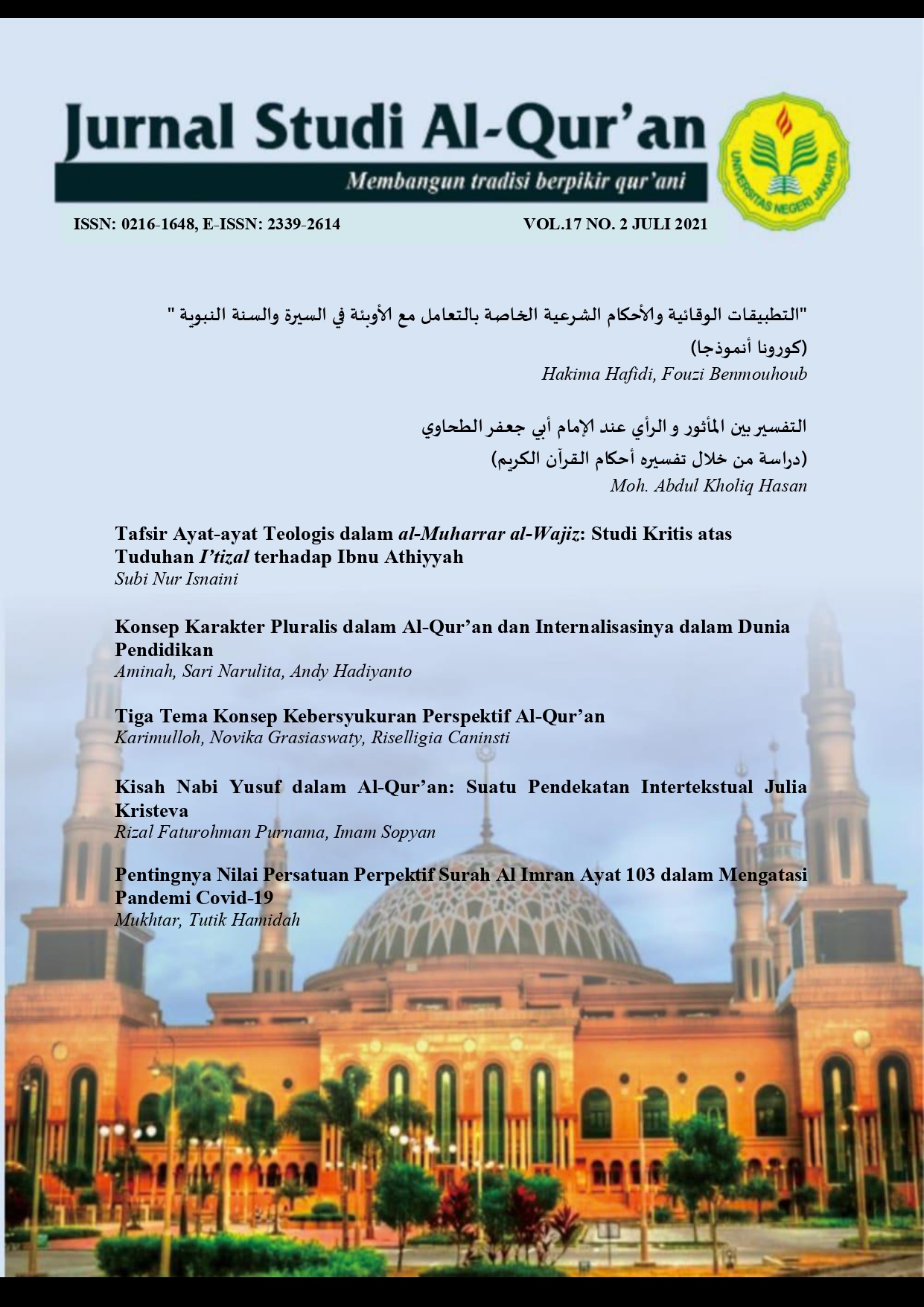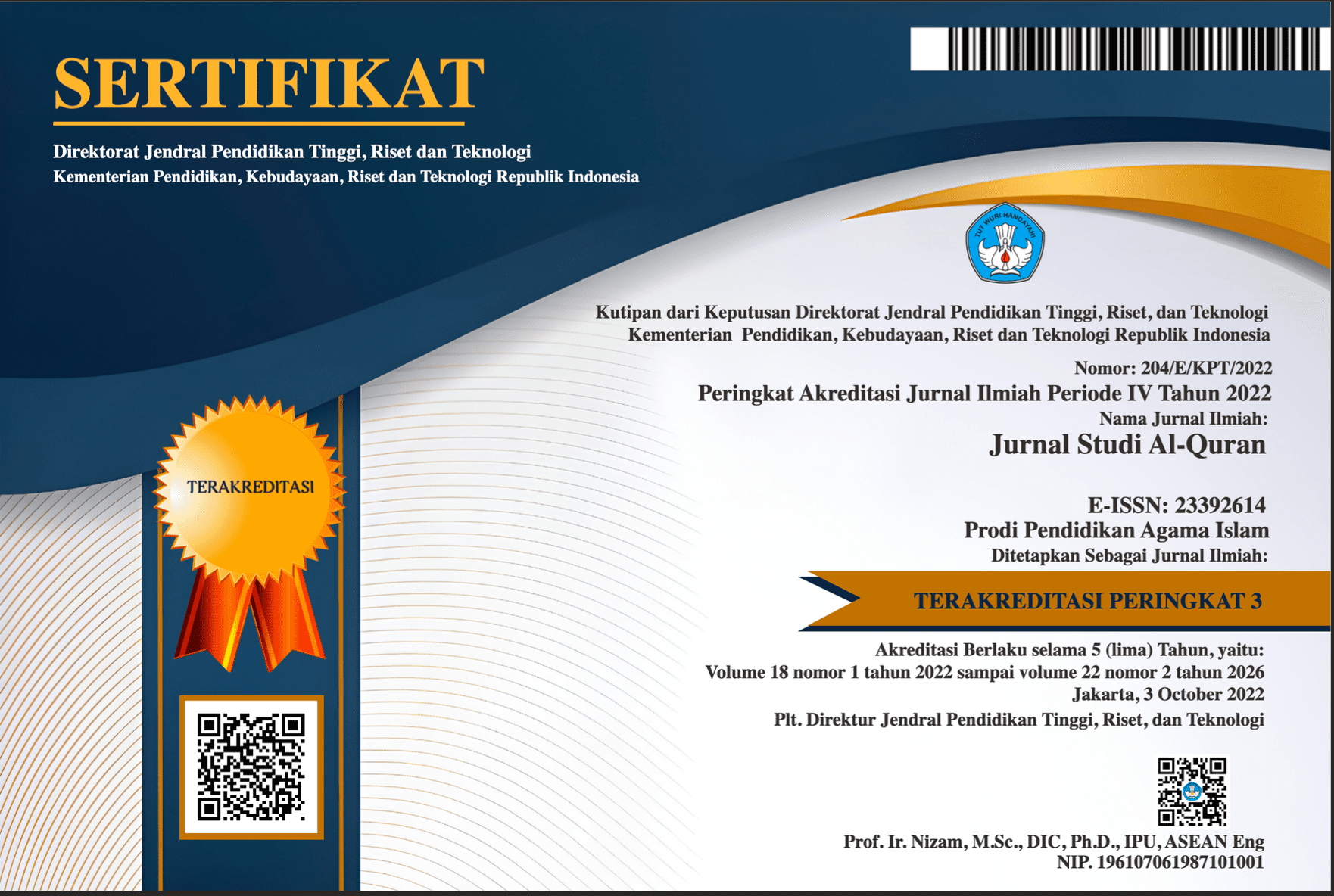Three Themes of the Concept of Gratitude in the Perspective of the Qur'an: A Literature Review
DOI:
https://doi.org/10.21009/JSQ.017.2.05Keywords:
Gratefulness, Al-Qur’anAbstract
Abstract
A human being receives many blessings, but a few people who are considered as grateful human in the Qur'an are important things to study. There are few studies discussing gratefullness (shukr) in Indonesia. Mostly talking gratitude from social and individual perspectivem but lack of Islamic literacy, especially from the primary Islamic reference source, namely the Al-Qur'an, is the main objective of this research. The research method used is literature review study by analyzing the verses of gratitude in the Al-Qur'an with a thematic interpretation approach and Islamic science studies. The results of the study show that there are three major themes of the concept of gratitude contained in the Qur'an and supported by the interpretations of the scholars. The three major themes are (1). The command to be grateful in the perspective of the Al Quran, (2) the positive impact of gratitude contained in the Al Quran, and (3) the factors that cause gratitude described in the Al Quran. This result also explains that a grateful person must get the pleasure of Allah SWT, and he will avoid the torment of hellfire and get additional favours, both in this world and in the hereafter. So that someone can be grateful, it is advisable to look at people who are lower in rank, remember the blessings that Allah has given him, and ask Allah SWT to be given the strength to give thanks to Him.
References
Al-Lusy, M. (1994). Ruhul Ma’ani. Darul Kutub Al-‘Alamiyah.
Al-Munjid, M. S. (2009). Asy-Syukur. Zad Group.
Al-Qurthubi, M. (2006). Al-Jami Li Ahkamil Qur’an. Al-Resalah Publishers.
Al-Zamakhsary, A. A.-Q. (2009). Tafsir Al-Kasyaf. Darul Ma’rifah.
Alddino Gusta Rachmadi, D. (2004). Kebersyukuran: Studi Komparasi Perspektif Psikologi Barat dan Psikologi Islam. PSIKOLOGIKA: Jurnal Pemikiran Dan Penelitian Psikologi, 24(2).
An-Naisaburi, M. (2006). Shohih Muslim. Dar At-Thaybah.
Ar-Razi, M. (1981). Tafsir Al-Fakhrurrazi. Dar al-Fikr.
As-Samarkandi, A. L. (2000). Tanbihul Ghofilin. Dar Ibnu Katsir.
At-Thobari, I. J. (2000). Tafsir At-Thabari. Maktabah Ibnu Taimiyah.
At-Turmudzi, A. I. (1996). Al-Jami’ Al-Kabir. Darul gharb Al-Islami.
Engharian, D. A. (2019). Syukur dalam Perspektif al-Qur’an. Jurnal El-Qanuny. Jurnal Ilmu Kesyariahan Dan Pranata Sosial, 5(2).
Malik, R. K. (2019). Hermeneutika Al-Qur’an dan Debat Tafsir Modern: Implementasinya dengan Masa Kini. At-Turas: Jurnal Studi Keislaman, 6(1).
Mandzu, I. (2010). Lisan Al-Arab. Dar Sadr.
Muhammad, A. (n.d.). Tafsir Ibnu Katsir. Pustaka Imam Asy-Syafi’I.
Rizky Susanti, D. (2020). Psikoedukasi Kebersyukuran Kepada Tuhan. ALTRUIS: Journal of Community Services, 1(1).
Shohibah, I. F. (2014). KEBERSYUKURAN (Upaya Membangun Karakter Bangsa Melalui Figur Ulama). Jurnal Dakwah, 15(2).
Sohrah. (2020). Etika Makan dan Minum Dalam Pandangan Syariah. Al-Daulah, 1(1).
Syaibah, A. I. A. (2004). Al-Mushonnaf. Maktabah Ar-Rusyd.
Downloads
Published
How to Cite
Issue
Section
License
Authors who publish with this Journal agree to the following terms:
- Author retain copyright and grant the journal right of first publication with the work simultaneously licensed under a creative commons attribution licensethat allow others to share the work within an acknowledgement of the work’s authorship and initial publication of this journal.
- Authors are able to enter into separate, additional contractual arrangementfor the non-exclusive distribution of the journal’s published version of the work (e.g. acknowledgement of its initial publication in this journal).
- Authors are permitted and encouraged to post their work online(e.g. in institutional repositories or on their websites) prior to and during the submission process, as it can lead to productive exchanges, as well as earlier and greater citation of published works.
Users/public use of this website will be licensed to CC BY










